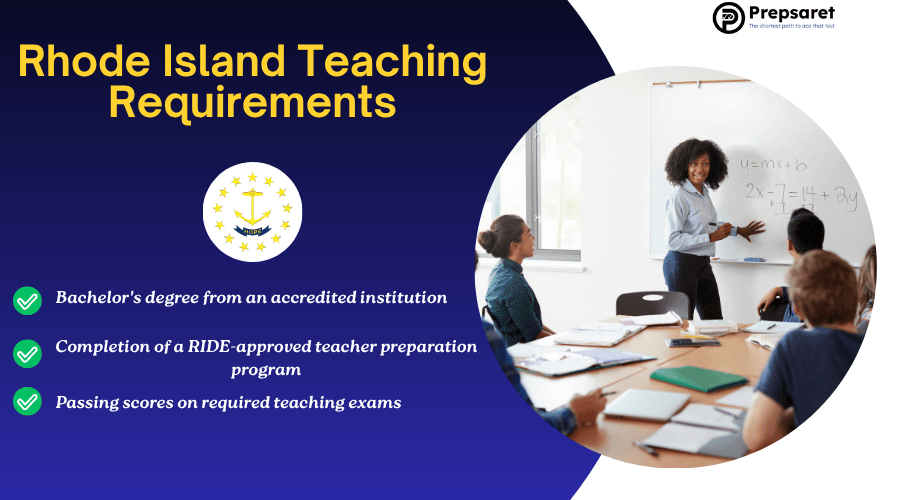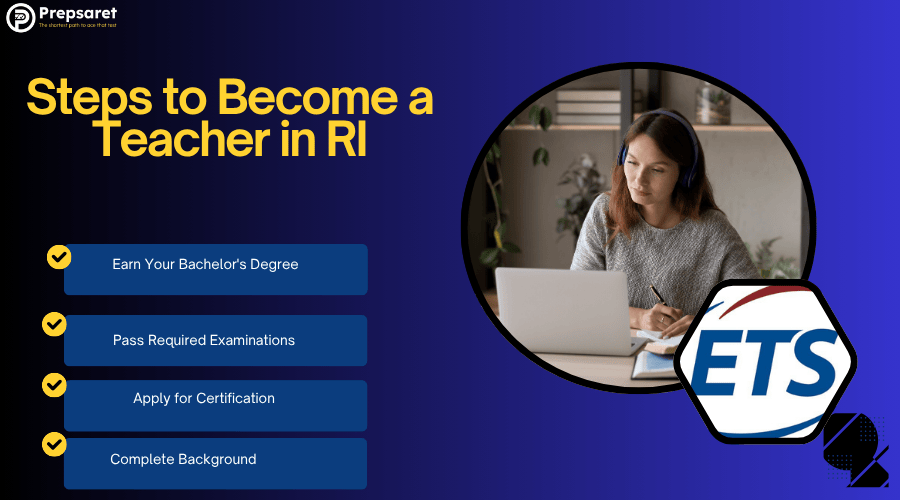Embarking on a teaching career in Rhode Island offers rewarding opportunities to shape young minds.
How to Become a Teacher in Rhode Island involves understanding certification pathways, meeting state requirements, and navigating the Rhode Island Department of Education (RIDE) process.
Whether you’re a recent graduate or career changer, this guide outlines the steps, testing requirements, and alternative routes available. At Prepsaret, we provide comprehensive prep materials to help you ace your teaching exams and achieve your certification goals efficiently.
Rhode Island Teaching Requirements
Before diving into how to become a teacher in Rhode Island, you need to understand the foundational Rhode Island teaching requirements. The state maintains specific standards to ensure qualified educators serve in Rhode Island public schools requirements.
Core Qualifications for Rhode Island Teachers
Rhode Island teacher qualifications include:
- Bachelor’s degree from an accredited institution (minimum requirement)
- Completion of a RIDE-approved teacher preparation program
- Passing scores on required teaching exams in Rhode Island
- Criminal background check and fingerprinting
- Evidence of good moral character
The Rhode Island Department of Education (RIDE) oversees all certification processes and maintains updated requirements on their official portal. Every prospective teacher must meet these baseline standards before receiving their Rhode Island teaching license.
Background and Character Clearance Processes
RIDE conducts thorough background investigations, including:
- State and federal criminal history checks
- Child abuse registry clearance
- Professional reference verification
These safeguards ensure student safety remains the top priority in Rhode Island public schools requirements.
Educational Pathways to Teaching in Rhode Island
Starting your career begins with completing teacher preparation programs in Rhode Island, the most common route for aspiring educators.
These Rhode Island teacher education programs combine coursework, mentorship, and classroom experience to prepare candidates for the profession.
What to Expect:
- Foundational coursework in pedagogy, child development, and educational psychology
- Subject-specific training aligned with your certification area
- Student teaching placements lasting one full semester
- Mentorship from experienced classroom teachers
- Integration of Rhode Island curriculum standards
Best Teacher Preparation Programs in Rhode Island
Several institutions provide some of the best teacher preparation programs in Rhode Island:
- Rhode Island College – Comprehensive elementary and secondary programs
- University of Rhode Island – Strong emphasis on research-based practices
- Providence College – Liberal arts approach with education focus
- Johnson & Wales University – Specialized career and technical education tracks
All RIDE-approved programs must meet rigorous accreditation standards through the Council for the Accreditation of Educator Preparation (CAEP). Choosing an accredited program ensures your coursework fulfills Rhode Island teacher qualifications.
Teacher Licensure Process in Rhode Island
The teacher licensure process in Rhode Island involves multiple checkpoints. Obtaining your teaching credential Rhode Island requires careful attention to deadlines and documentation.
Key Components of Rhode Island Teacher Certification
- Completion of approved educator preparation
- Praxis Core Academic Skills tests (reading, writing, mathematics)
- Praxis Subject Assessments in your teaching field
- Application submission through the RI teacher certification Portal
- Processing fees and credential review
Teaching Exams in Rhode Island
Teaching exams in Rhode Island primarily use the Praxis series:
- Praxis Core – Measures basic academic skills
- Praxis Subject Assessments – Tests content knowledge in specific teaching areas
- Praxis Principles of Learning and Teaching (PLT) – Evaluates pedagogical understanding
Preparation is crucial. At Prepsaret, we offer targeted practice tests mirroring actual exam formats, helping you identify knowledge gaps and build confidence before test day.
Types of Rhode Island Teaching Licenses
Your Rhode Island teaching license classification depends on your experience:
- Initial Educator License – Valid 3 years for new teachers
- Professional Educator License – Requires 3 years successful teaching
- Advanced Educator License – Demonstrates mastery through National Board Certification or equivalent
Steps to Become a Teacher in RI
The steps to become a teacher in RI follow a clear sequence established by the Rhode Island Department of Education. Here’s how to get started:
Step 1: Earn Your Bachelor’s Degree
Complete a four-year degree program, preferably in education or your content area. Requirements to teach elementary school in Rhode Island include elementary education coursework, while secondary certification requires subject-specific majors.
Step 2: Complete Teacher Preparation
Enroll in RIDE-approved teacher preparation programs in Rhode Island. Your program includes supervised student teaching experiences.
Step 3: Pass Required Examinations
Schedule and complete all necessary Praxis exams. Prepsaret provides exact practice questions and comprehensive study materials to maximize your success rates.
Step 4: Apply for Certification
Submit your application through the Rhode Island Department of Education (RIDE) portal with:
- Official transcripts
- Exam score reports
- Background check results
- Application fees
Step 5: Complete Background:
Screening Undergo fingerprinting and criminal history review as mandated by state law.
Step 6: Receive Your License
Once approved, RIDE issues your teaching credential Rhode Island, allowing you to begin your career.
Requirements to Teach Elementary School in Rhode Island
- Bachelor’s degree with elementary education focus
- Praxis Elementary Education: Content Knowledge exam
- Praxis Elementary Education: Multiple Subjects exam
- Demonstrated competency across core subjects (math, reading, science, social studies)
Steps to Becoming a High School Teacher in Rhode Island
The steps to becoming a high school teacher in Rhode Island follow a similar pattern with subject-specific focus:
- Bachelor’s degree in subject area (English, mathematics, science, etc.)
- Subject-specific Praxis Content Knowledge exam
- Secondary education coursework or preparation program
- Student teaching at the secondary level
What Degree Do You Need to Become a Teacher in Rhode Island?
A bachelor’s degree from an accredited institution is the minimum requirement.
Elementary teachers typically major in elementary education, while secondary teachers need content-area degrees (mathematics, English, science, etc.) plus pedagogical training through approved preparation programs.
Alternative Pathways to Teaching in Rhode Island
Not everyone follows the traditional route. Alternative teacher certification Rhode Island options accommodate career changers and professionals with valuable expertise.
Features of Alternative Certification Programs
- Accelerated timelines (often 1-2 years)
- Employment while completing certification requirements
- Mentorship from veteran educators
- Flexibility for working professionals
Alternative Routes to Teacher Certification in Rhode Island
There are several alternative routes to teacher certification in Rhode Island, including:
- Teach For America – Two-year commitment serving high-need schools
- Career and Technical Education (CTE) Pathways – For professionals with industry expertise
- Post-Baccalaureate Programs – For degree holders without education backgrounds
- Provisional Certification – Teaching while completing remaining requirements
How to Become a Teacher in Rhode Island Without Education Degree
How to become a teacher in Rhode Island without a traditional education degree is possible through alternative programs. Candidates must:
- Hold a bachelor’s degree in any field
- Enrollment in alternative certification program
- Obtain a provisional license while completing pedagogical training
- Meet the same testing requirements as traditional candidates
How to Become a Teacher in Rhode Island Online
Several institutions offer distance learning options: How to become a teacher in Rhode Island online often involves:
- Fully online coursework with virtual instruction
- Hybrid models combining online theory with local student teaching
- Flexible scheduling for working adults
- Same RIDE approval and accreditation standards
Online programs maintain rigorous standards while providing convenience. You’ll still complete required clinical experiences in actual Rhode Island public schools.
How Long Does It Take to Get a Teaching License in Rhode Island?
Traditional preparation takes four years (bachelor’s degree program). Alternative certification programs range from 1-2 years for those with existing degrees. Application processing adds 4-6 weeks once all materials are submitted to RIDE.
Certification and Licensing Process in Rhode Island
The Rhode Island Department of Education (RIDE) oversees certification, offering tools and options for candidates and districts. The process includes emergency pathways, online applications, and public verification systems.
Emergency Teacher Certification in RI
Emergency teacher certification RI addresses critical staffing shortages. RIDE may grant temporary authorization when:
- Qualified candidates are unavailable
- District demonstrates recruitment efforts
- Candidate possesses relevant expertise
- Public school needs are urgent
These emergency credentials are non-renewable and require educators to work toward full certification while teaching.
RI Teacher Certification Portal
The RI teacher certification Portal is the central hub for managing credentials. Through the portal, candidates can:
- Submit applications and upload required documents
- Track application status and license renewals
- Maintain professional development records
This online system simplifies communication with RIDE and speeds up processing times.
RI Teacher Certification Verification
The RI teacher certification Verification tool allows schools and the public to confirm an educator’s license. It provides access to:
- Current license status
- Endorsement areas
- Credential expiration dates
Maintaining up-to-date certification is essential for continued employment in Rhode Island public schools.
Reciprocity and Out-of-State Teachers in Rhode Island
Rhode Island teacher certification reciprocity simplifies the process for certified out-of-state educators. RIDE recognizes valid teaching licenses from other states through interstate agreements.
Key Benefits of Rhode Island Reciprocity Agreement
- Streamlined application process
- Reduced duplicate testing requirements
- Faster processing timelines
- Recognition of teaching experience
Rhode Island Teacher Reciprocity Guidelines
Rhode Island teacher reciprocity requires:
- Valid, current teaching license from another state
- Completion of equivalent preparation program
- Passing scores on comparable examinations
- Good standing in previous state
Some content-specific tests may still be required depending on your endorsement area and original certification state.
Rhode Island Teacher Certification Reciprocity for Out-of-State Teachers
Rhode Island teacher certification reciprocity for out-of-state teachers operates through the National Association of State Directors of Teacher Education and Certification (NASDTEC) Interstate Agreement. This compact facilitates mobility for educators across participating states.
Requirements for Valid Out-of-State License Recognition
- Submit reciprocity application through RI teacher certification Portal
- Provide official license verification from original state
- Include transcripts and test scores
- Pay applicable fees
Most reciprocity applications process within 30-60 days when complete documentation is provided.
Rhode Island Teacher Salary and Benefits
Teaching in Rhode Island offers both competitive pay and strong benefits, making it an attractive career choice.
Rhode Island Teacher Salary Overview
Rhode Island Teacher salary rates are competitive within the New England region. Compensation depends on district, experience, and education level:
- Starting teachers: $42,000–$48,000
- Mid-career (10–15 years): $65,000–$75,000
- Veteran educators (20+ years): $80,000–$95,000
Urban districts like Providence and Cranston typically offer higher salaries than rural areas.
Rhode Island Teacher Benefits
Beyond salary Rhode Island teacher receive:
- Comprehensive health, dental, and vision insurance
- State pension retirement plan with employer contributions
- Paid time off, including summers and holidays
- Tuition reimbursement for advanced degrees
- Ongoing professional development support
These benefits significantly enhance total compensation, making teaching in Rhode Island financially attractive.
RI Department of Education Teaching Application Process
Rhode Island Department of Education teaching application process requires careful preparation to avoid delays.
Required Documentation:
- Completed online application via RI teacher certification Portal
- Official transcripts (sealed, sent directly from institutions)
- Praxis score reports
- Background check results
- Professional references
- Application fees ($50-$100 depending on license type)
Timeline Expectations:
- Complete applications process in 4-6 weeks
- Incomplete submissions experience significant delays
- Emergency situations may expedite processing
Pro Tip: Gather all documents before starting your online application to complete it in one session smoothly. Careful preparation reduces the need for follow-up with RIDE staff.
How to Become a Teacher in Rhode Island: FAQs
How Much Do Teachers Make in Rhode Island?
Rhode Island teachers earn competitive salaries averaging $65,000 annually. Beginning educators start around $42,000-$48,000, while experienced teachers with advanced degrees can exceed $90,000.
Is There a Teacher Shortage in Rhode Island?
Yes, Rhode Island experiences shortages in specific areas including special education, STEM subjects (mathematics, science), and bilingual education.
What Is the Lowest Degree You Need to be a Teacher?
A bachelor's degree is the minimum requirement for teaching in Rhode Island public schools. No pathway exists for associate degree holders to obtain full teacher certification.
Can I Become a Teacher in 2 Years?
Yes, if you already hold a bachelor's degree. Alternative certification programs and post-baccalaureate options allow career changers to complete teacher preparation in 1-2 years.
What Is the Easiest Teacher to Become?
No teaching certification is inherently easy, all require dedication and mastery of content and pedagogy. However, high-need areas like special education and career/technical education sometimes offer streamlined pathways or provisional licenses due to staffing shortages, making entry somewhat more accessible.
Conclusion: Your Path to the Classroom in Rhode Island
How to Become a Teacher in Rhode Island offers multiple pathways whether you’re pursuing traditional preparation or alternative certification.
Success requires understanding Rhode Island teaching requirements, passing required exams, and completing the Rhode Island Department of Education (RIDE) application process.
From requirements to teach elementary school in Rhode Island to reciprocity options for out-of-state educators, this comprehensive roadmap guides your journey.
Start preparing today with Prepsaret’s expertly designed practice tests, featuring exact exam questions and detailed answers, to ensure you pass your certification exams confidently.




